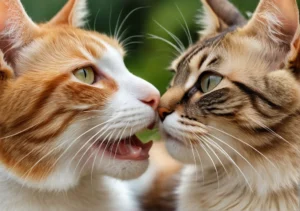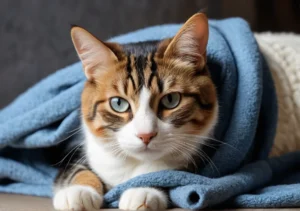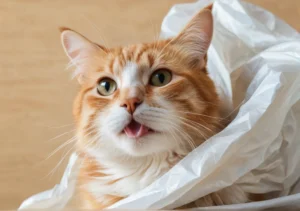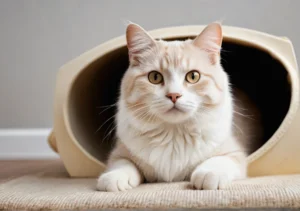Cats are fascinating creatures with quirky behaviors that often leave us puzzled. One such behavior is when cats suddenly start biting the air for seemingly no reason at all. It’s a strange sight to witness, but there are actually reasons behind this peculiar behavior.
Have you ever wondered why your cat suddenly starts biting at the air? Let’s explore some possible explanations for this odd behavior.
Playful Behavior
When your cat starts biting at the air, don’t fret – it might just be a sign of their playful nature. Cats are natural-born hunters and sometimes, they engage in this behavior as a way to simulate hunting. It’s like they’re practicing their moves before the real deal. So, if you catch your furry friend nibbling at an invisible snack, it could be their way of staying sharp and entertained.
Next time you see your cat playfully biting at the air, try engaging them in interactive activities. Bring out their favorite toys, such as feather wands or laser pointers, to channel their energy in a positive way. This not only fulfills their natural instincts but also strengthens your bond with your feline companion. Remember, a happy cat is a playful cat!
Hunting Instincts
A cat’s urge to bite at the air may stem from their innate hunting instincts. In the wild, cats rely on stalking and pouncing techniques to catch their prey. When your cat exhibits this behavior indoors, they might be manifesting their primal instincts in a domestic setting.
To satisfy your cat’s hunting instincts, consider interactive feeding toys or puzzle feeders. These tools not only provide mental stimulation but also encourage your cat to “hunt” for their food, mimicking the thrill of a successful prey hunt. By tapping into your cat’s natural behaviors, you can help them lead a fulfilling and enriched life.
List of Tips to Redirect Biting Behavior: 1. Provide plenty of interactive toys to keep your cat engaged. 2. Incorporate puzzle feeders to stimulate their hunting instincts. 3. Schedule regular play sessions to burn off excess energy. 4. Consider clicker training to redirect their focus.
Remember, understanding why your cat engages in certain behaviors can strengthen your bond and improve their overall well-being. By acknowledging their playful and instinctual nature, you can create a happier and healthier environment for your feline friend.
Stress or Anxiety
Does your cat sometimes seem to be biting at the air out of nowhere? Well, it could be a sign that they’re feeling a bit stressed or anxious. Just like humans, cats can experience these emotions too. If your furry friend is displaying this behavior, try to create a calm and peaceful environment for them. Provide hiding spots, soothing music, or even try using pheromone diffusers to help alleviate their stress. Spending quality time with them through play and cuddles can also work wonders in reducing their anxiety levels. Remember, a happy cat is a healthy cat!
Sensory Stimulation
Have you ever noticed your cat biting at the air during playtime or when they’re feeling particularly curious? This behavior could be their way of engaging their senses in a different way. Cats have incredibly sharp senses, and biting at the air allows them to hone in on specific scents, sounds, or movements around them. It’s an instinctual behavior that helps them stay sharp and alert. To provide additional sensory stimulation for your cat, consider interactive toys, puzzle feeders, or even a window perch where they can watch the world outside. Keeping your cat mentally stimulated is key to their overall well-being.
Additional Unique Insight: Interactive Feeding Toys
- Interactive feeding toys that require your cat to work for their food can provide both mental stimulation and satisfy their hunting instincts.
- By encouraging your cat to “hunt” for their meals, you’re tapping into their natural behaviors and providing a fun and engaging way to eat. This can also help prevent boredom and reduce the likelihood of air-biting behavior.
Dental Health
When cats bite the air, it could be a sign of underlying dental issues. Just like humans, cats can suffer from gum disease, tooth decay, and other oral problems. If your feline friend is frequently nipping at the air, it might be time for a trip to the vet. Dental health is crucial for cats, as untreated issues can lead to pain, difficulty eating, and even systemic infections. Regular dental check-ups and professional cleanings are essential for maintaining your cat’s oral hygiene.
Lack of Stimulation
Does your cat seem to be biting at the air out of boredom? Cats are intelligent and curious creatures that need mental and physical stimulation to thrive. If they are not mentally engaged or physically active, they may exhibit odd behaviors like biting at the air. To keep your furry friend entertained, consider providing interactive toys, puzzle feeders, and regular play sessions. Additionally, creating enrichment opportunities like cat shelves or cat trees can help stimulate your cat’s mind and prevent unwanted behaviors. Remember, a happy cat is a well-stimulated cat!
Unique Insight: Providing your cat with a window perch where they can watch birds and other outdoor activities can also help alleviate boredom and reduce the likelihood of air-biting.
Medical Conditions
Cats may bite at the air due to underlying medical conditions that need prompt attention. Seizures or neurological issues could be culprits, causing your feline friend to exhibit unusual behavior. If you notice your cat repeatedly biting at the air, it’s crucial to seek veterinary care immediately. These symptoms could be signs of a more serious health issue that requires professional diagnosis and treatment.
Behavioral Training
When it comes to discouraging your cat’s air-biting behavior, positive reinforcement is key. Redirect your cat’s attention by engaging them in enrichment activities like puzzle toys or interactive games. Training sessions using treats and praise can also help steer your cat away from this behavior. Remember to stay patient and consistent in your efforts to address and correct this habit.
- Provide Toys: Offer a variety of interactive toys to keep your cat mentally stimulated.
- Scratching Posts: Encourage appropriate scratching behavior with scratching posts around your home.
- Regular Playtime: Dedicate time each day for play and exercise to expel excess energy.
- Ignoring Bad Behavior: If your cat starts biting at the air, calmly redirect their attention to a more appropriate activity.
Remember, understanding your cat’s behavior is crucial in addressing any underlying issues. If you’re unsure about how to handle your cat’s air-biting tendencies, don’t hesitate to consult a professional behaviorist or veterinarian for further guidance.
Interesting Fact:
Did you know that cats have a heightened sense of hearing compared to humans? Their ability to detect high-frequency sounds that are inaudible to us could be one reason why they seem to be “biting the air.” This behavior might be triggered by faint noises or even imaginary sounds that capture their attention, causing them to playfully nibble at the air.
With a better understanding of why cats bite at the air, you can navigate this quirky behavior with patience and insight into your feline companion’s unique ways.
Insightful Tip:
Next time you catch your cat playfully biting at the air, try to observe their surroundings. Are there small insects buzzing around, causing them to react instinctively? Providing interactive toys to keep them mentally stimulated can help curb this behavior and redirect their playful energy. Remember that every cat is an individual, so take the time to understand what triggers your furry friend’s antics.
Alex, a passionate animal lover, has experience in training and understanding animal behavior. As a proud pet parent to two dogs and three cats, he founded AnimalReport.net to share insights from animal experts and expand his knowledge of the animal kingdom.




